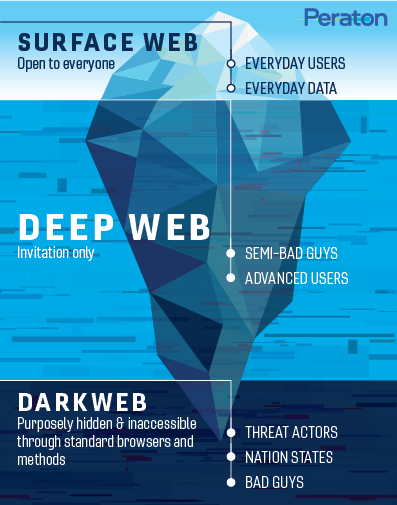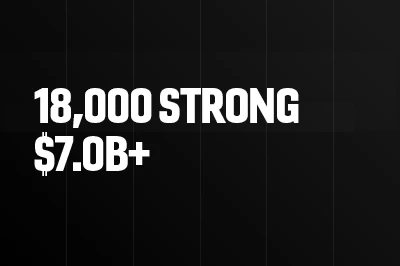The world wide web is just the tip of the iceberg when it comes to what is online. Beyond all the websites indexed by Google and other common search engines is the deep web—and buried within that is the dark web.
 The deep web, or second layer, is any website that does not appear as a search engine result when users browse content. There are many reasons why a search engine would not index a page—perhaps it is an old page with no identifiable keywords, or it is part of an organization’s members-only site. The deep web could also be used to house private information and information that needs to remain secret, such as legal or scientific documents, medical records, or competitor information.
The deep web, or second layer, is any website that does not appear as a search engine result when users browse content. There are many reasons why a search engine would not index a page—perhaps it is an old page with no identifiable keywords, or it is part of an organization’s members-only site. The deep web could also be used to house private information and information that needs to remain secret, such as legal or scientific documents, medical records, or competitor information.
A level beyond the deep web is the dark web, which is a small segment of the internet containing purposefully hidden websites accessible only using an encrypted browser such as The Onion Router, known as Tor.
Here are some things to know about the dark web:
1. You need to know what you are looking for.
“The dark web requires a different mindset and skill set,” says Peraton vice president John M. “There are no traditional search engines and algorithms to guide users, who must have patience to analyze and hunt for the data they are looking for.” The dark web also requires that the user verify the accuracy of information found on certain sites and confirm that the sources are relevant. There is no way to stumble upon websites, outside of the links posted by others publicly—every action must be deliberate. Sites and website pages or forums go up and come down, sometimes in a matter of days, adding another element of navigational difficulty that differentiates the dark web from the surface web.
2. It is easy to infect your machine while searching the dark web.
The dark web is unregulated, providing less protection to users. As a result, it is easy to infect your machine by clicking links or downloading information. “Many of the websites accessible via a Tor browser are laden with malware,” warns John M. “If you’re going to search the dark web, it is best that you do it with a machine you can re-image when you’re done.” He also notes that accessing some information on the dark web could violate federal law, even if the user unintentionally accesses the information in question.
3. Smart organizations leverage the dark web to fortify security.
Government agencies and contractors can employ services Exploiting open source intelligence provides situational awareness.
Knowing what types of exploits are being performed on one’s organization allows leaders to plan damage control before something happens. For example, a company can search the dark web to see if any of its internal IP addresses, usernames, and passwords have been posted. If a data breach happens, it is better to be aware of it and be proactive before it goes public.
“Most organizations don’t find out their information has been compromised and that their employees or clients have been put at risk until they read about it along with the general public,” says John M. “By that point, it is much harder to recover the leaked information and implement damage control.”
4. There are some benefits to the dark web.
The dark web can help protect users’ privacy in ways the surface web often fails to do. For example, users evading government censorship can share information about what is happening in their country. Whistleblowers often come to the dark web to find allies who can take their secrets and share them more publicly elsewhere.
When the COVID-19 outbreak began in Wuhan, China, information about the outreach was initially censored, and doctors were restricted from speaking out about the threat. Concerned about the potential spread of the virus, Chinese netizens posted updates to the dark web, knowing it would be much harder for their government to trace the leaked information.
5. Many dark web sites are interactive forums rather than static pages.
The dark web is filled with locked-down forums, where information is shared and bartered. The average internet user will not be involved in this world since access is by invitation only. The more nefarious activities on the dark web tend to happen in these chat forums. Because of that, intelligence gathering also tends to require personal participation in these chat forums to get the real scoop. Federal agencies often track anonymous chat participants to glean clues for investigations or piece together a suspect’s identity.
The dark web is only a small portion of the deep web, but it poses outsized reasons for concern and caution. Having the tools to expose dark web dangers and defend against them is a crucial asset for any company or government agency.





